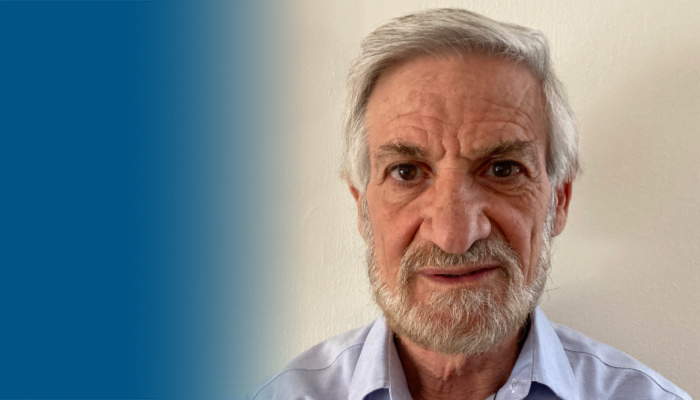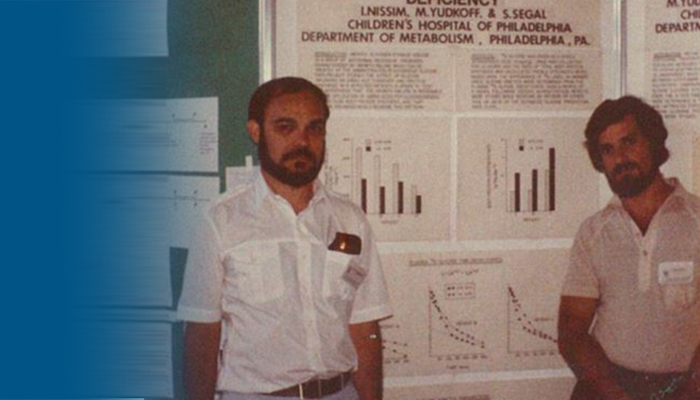HOW CAN WE HELP YOU? Call 1-800-TRY-CHOP
In This Section
From ‘Generation to Generation:’ Faculty Spotlight With Itzhak Nissim, PhD

Itzhak Nissim, PhD
Editor's Note: Welcome to our monthly Faculty Spotlight series, in which we sit down with faculty members at Children’s Hospital of Philadelphia Research Institute to learn more about their research and roles. Through these spotlights, our readers meet the diverse, dedicated, and distinctive individuals who lead our research community in our mission to improve children’s health. This year, we will be asking our featured scientists about mentorship — why it matters and how it has influenced their careers. In this Q&A, we feature Itzhak Nissim, PhD, biochemist in the Nissim Laboratory. Stay tuned for more from our Faculty Spotlight series throughout this year!

Dr. Nissim with his mentor, Dr. Marc Yudkoff (far right) at a 1980 scientific meeting in Jerusalem.
How long have you been at CHOP?
I was introduced to CHOP in 1978 when Marc Yudkoff, MD, then touring Israel on his honeymoon, visited me at the Weizmann Institute. Dr. Yudkoff is the William T. Grant Endowed Chair in Child Development and Rehabilitation at CHOP. In 1979, I began a post-doc fellowship at CHOP. For the past 43 years, I have had the honor of being affiliated with CHOP as a member of the faculty.
Tell us a little about your research specialty.
My research focus has been the study of the metabolome and fluxome and the relationship of these parameters to the genome in normal and disease states. I was among the first scientific pioneers to deploy mass spectrometry (MS) and nuclear magnetic resonance (NMR) spectroscopy to trace the origin and fate of essential compounds such as amino acids and glucose. I wanted to better define the underlying biochemistry of inherited and acquired disorders, the hope being that such information might enable better treatments. My research has scrutinized many disease states, including the metabolic syndrome, primary derangements of hepatic function, the mitochondropathies, metabolic patterns in malignancy, and sundry inborn errors of metabolism. At CHOP and the University of Pennsylvania I have collaborated with numerous investigators who made productive use of my background in metabolic research. These investigations have transformed our understanding of disease processes and, in several instances, have led to the development of novel therapeutic interventions.
Why did you choose to focus on that specialty?
I have always wanted to understand human metabolism at a fundamental level, a goal for which stable isotope methodology is ideally suited. These tracers enable a site of metabolic dysfuncton to be identified with exquisite precision, both in living cells and in the whole organism. Clinical researchers then can utilize this information to develop more effective therapies.
Can you tell us about a current or recent research project that you are excited about?
I have been honored to work with Celeste Simon, PhD, Scientific Director of the Abramson Family Cancer Research Institute at the University of Pennsylvania, on her seminal studies of cancer metabolism. This research has helped to explain how the process of malignant transformation alters and appropriates cellular metabolism, in order to accommodate the rapid rate of cell division and growth that typify so many cancers.
What are the long-term research questions you hope to answer?
My long-range goal is to promote an understanding of metabolism that will enable interventions that improve patient outcome in diseases such as cancer, metabolic syndrome, inborn errors such as urea cycle defects, and neurologic disorders like epilepsy. These therapeutic interventions assume many forms, including dietary manipulation, novel medications, and cutting-edge treatments like gene therapy and gene editing.
Can you tell us about how mentorship has impacted your career? Why do you believe mentoring is important in science?
Many individuals furnished mentorship during my long career at CHOP and Penn. I especially acknowledge Stanton Segal, MD, physician and researcher at the University of Pennsylvania, and Dr. Marc Yudkoff. Mentorship is essential to scientific advancement. Training of young scientists is vital to the process of transferring existing information and assuring the entry of promising young investigators who keep the scientific enterprise fresh and buoyant. Science is not only an intellectual discipline but an ongoing culture that requires constant renewal. As we say in Hebrew, it is a process that must exist “Mi’dor L’dor” – from generation to generation.


